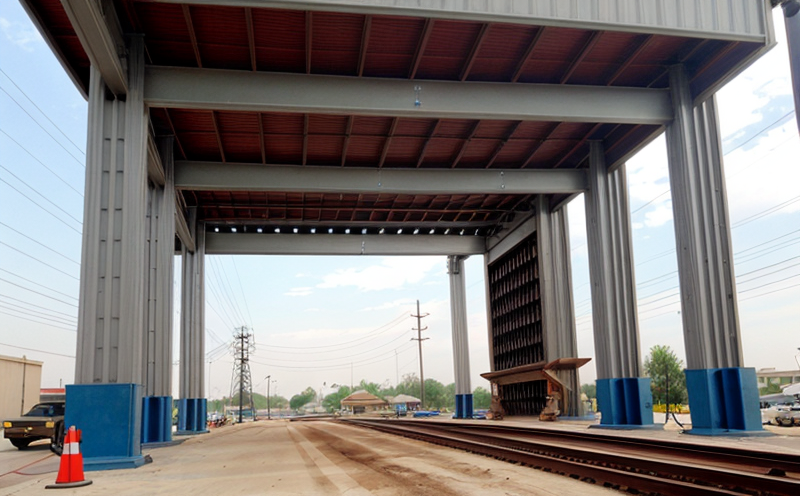MIL-HDBK-516 Airworthiness Structural Testing Standards
The MIL-HDBK-516 airworthiness structural testing standards are a cornerstone of aerospace and aviation quality assurance. Developed by the United States military, these standards provide comprehensive guidelines for the design, manufacturing, inspection, and certification processes that ensure the structural integrity of aircraft components.
These standards cover a wide range of materials used in aviation structures, including aluminum alloys, composites, titanium alloys, and other advanced materials. The tests are designed to simulate real-world loading conditions that aircraft might encounter during flight. This includes static strength testing, fatigue testing, environmental exposure testing, and dynamic load testing.
The process begins with the selection of appropriate specimens for testing. These specimens must be representative of the actual components they will replace in the aircraft. Once selected, the specimens undergo rigorous preparation to ensure accurate test results. Preparation includes cleaning, marking, and sometimes machining or bonding layers prior to testing.
Testing is conducted using a variety of specialized equipment tailored to simulate different stress conditions. For example, static tests use hydraulic presses to apply known loads to the specimen until failure occurs. Fatigue tests involve cyclic loading to determine how many cycles a material can withstand before failure. Environmental exposure tests are carried out in climatic chambers that replicate various atmospheric conditions such as humidity, temperature, and altitude.
The results of these tests are meticulously recorded and analyzed according to MIL-HDBK-516 standards. Compliance with these standards ensures that the structural integrity of aircraft meets or exceeds military specifications. Reports generated from these tests are crucial for design validation, quality assurance, and regulatory compliance.
Certification bodies often require adherence to MIL-HDBK-516 when approving new materials or components for use in aerospace applications. This certification not only enhances the safety of passengers but also ensures that manufacturers meet stringent industry standards. The expertise required to interpret these results accurately is extensive, and it's why specialized laboratories like Eurolab are essential partners for aerospace companies.
Understanding MIL-HDBK-516 involves more than just knowing its requirements; it requires a deep understanding of the underlying principles that govern structural integrity in aviation. This knowledge allows engineers to make informed decisions about material selection, design modifications, and production processes. By adhering strictly to these standards, manufacturers can build confidence in their products while ensuring they meet all necessary regulatory requirements.
Eurolab Advantages
At Eurolab, we pride ourselves on offering unparalleled expertise in MIL-HDBK-516 compliance testing. Our team of highly skilled engineers and technicians is dedicated to providing accurate, reliable results that meet the highest standards set by this important document.
- State-of-the-art equipment: We have invested heavily in cutting-edge test stands and facilities specifically designed for structural integrity tests according to MIL-HDBK-516. This ensures our clients receive precise measurements and consistent results.
- Dedicated staff: Our personnel are trained extensively on the nuances of MIL-HDBK-516, allowing them to provide expert advice throughout your project lifecycle from initial design through final certification.
- Comprehensive services: Beyond just testing, Eurolab offers full-service solutions including consultation, specimen preparation guidance, and detailed reporting tailored specifically for MIL-HDBK-516 compliance.
We understand the critical nature of structural integrity in aviation. That’s why we go above and beyond to ensure every aspect of your project adheres strictly to MIL-HDBK-516 standards. From consultation through final certification, our team is committed to helping you achieve success with confidence.
Customer Impact and Satisfaction
- Enhanced Safety: By ensuring strict adherence to MIL-HDBK-516, we help our customers produce safer aircraft components. This reduces the risk of failures during flight which can have devastating consequences.
- Regulatory Compliance: Our services ensure that all testing meets or exceeds regulatory requirements, minimizing potential delays and costly non-compliance issues.
- Increased Confidence: Clients gain increased confidence in their products knowing they've been thoroughly tested according to MIL-HDBK-516 standards. This boosts brand reputation and marketability.
We consistently receive high praise from our customers for our commitment to quality and reliability. Many return to us time after time because of the consistent, top-notch service we provide.
International Acceptance and Recognition
- Global Standards: MIL-HDBK-516 is recognized internationally as a leading authority on structural integrity testing in aviation. Compliance with these standards ensures your products will be accepted worldwide.
- Inclusive Approach: The document covers various aspects of the manufacturing process, making it applicable across different aerospace companies and countries.
The widespread adoption of MIL-HDBK-516 underscores its importance in the aviation industry. Its international recognition ensures that manufacturers can confidently export their products to any market while maintaining high standards of quality and safety.





